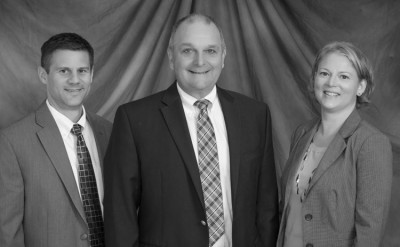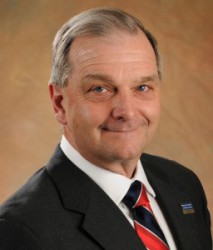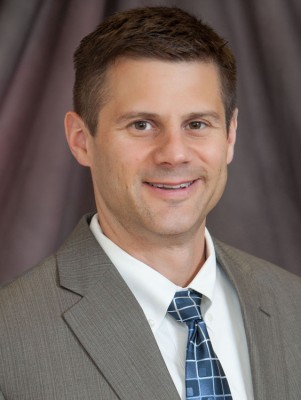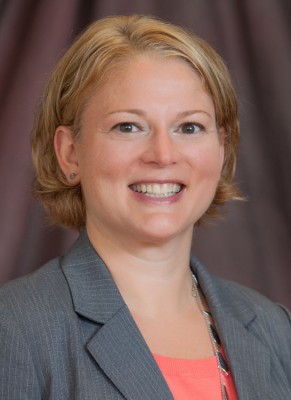 It wasn’t a desire for prestige that motivated Richard Schwab, Ph.D., to accept a second appointment as dean of UConn’s Neag School of Education for the next two years. It was a “passionate” desire to help the school achieve its ambitious academic vision, take the school and University to new heights, and to work with what he believes may be the most talented team of leaders and faculty the Neag School has ever had in place. “It’s more than a job to me,” said Schwab, who first served as dean from 1997-2009. His re-appointment this year makes him the longest-serving dean in the history of the school and the only alum to hold the position.
It wasn’t a desire for prestige that motivated Richard Schwab, Ph.D., to accept a second appointment as dean of UConn’s Neag School of Education for the next two years. It was a “passionate” desire to help the school achieve its ambitious academic vision, take the school and University to new heights, and to work with what he believes may be the most talented team of leaders and faculty the Neag School has ever had in place. “It’s more than a job to me,” said Schwab, who first served as dean from 1997-2009. His re-appointment this year makes him the longest-serving dean in the history of the school and the only alum to hold the position.
“I passionately believe in UConn, our leadership team, the faculty we have on board, and the mission we’ve put together,” he said. Outlined in the Neag School’s “Our Time: UConn’s Path to Excellence” academic plan, that mission includes being a state, national and global leader in how teachers are taught, as well as how educational policies and teaching methods are developed and implemented. Created by a diverse, multifaceted team consisting of Neag School administrators, staff, faculty and students, the plan outlines how UConn is uniquely positioned to use its expertise and knowledge base to address state and federal efforts to reinvent public education for the 21st century and address the educational inequalities that President Barack Obama calls “the civil rights issue of our time.” The plan also shows the many opportunities that exist for external funding, research, and collaboration with scholars not just from UConn, but from other universities around the nation and world, such as what occurs through UConn’s membership in Universitas 21, an international network of 21 leading research-intensive universities in 13 countries. It also shines a spotlight on four areas of research strength and scholarship that particularly position the Neag School and UConn as a global leader in education, including:
- Equity and social justice
- STEM education
- Creativity and innovation
- Educator quality and effectiveness
Actualizing these goals is Schwab’s top priority.
 “Education is at the heart of all the of the goals outlined in the University’s strategic plan, because education is at the heart of every job performed in this country,” said Schwab, who chaired the university-wide Academic Vision Committee that designed and produced UConn’s five-year strategic plan. “Without the best educators, we don’t have the best lawyers, engineers or policy makers. Even more fundamental than that, if we don’t have effective, vibrant K-12 teachers, we don’t have vibrant students who believe in their abilities, want to go on to college and make a difference in the world. So ensuring that the Neag School jumpstarts and actualizes its plan is my top priority.”
“Education is at the heart of all the of the goals outlined in the University’s strategic plan, because education is at the heart of every job performed in this country,” said Schwab, who chaired the university-wide Academic Vision Committee that designed and produced UConn’s five-year strategic plan. “Without the best educators, we don’t have the best lawyers, engineers or policy makers. Even more fundamental than that, if we don’t have effective, vibrant K-12 teachers, we don’t have vibrant students who believe in their abilities, want to go on to college and make a difference in the world. So ensuring that the Neag School jumpstarts and actualizes its plan is my top priority.”
Among those working with Schwab to, ultimately, improve the way students learn is a team of new and existing faculty members brought together as part of an ambitious hiring plan launched in 2012 by UConn President Susan Herbst. Tasked with re-envisioning how both the Neag School and scholars in the field of education can best improve educational practices and policies, that team includes 17 new faculty members—all of them proven or emerging leaders in their areas of expertise—working alongside already exemplary, existing faculty members.
Included within this highly energized and committed group are experts in school change, education equity and access, large-scale measurement and evaluation, STEM education, and educator preparation. And for Melinda George, president of the Washington, D.C.-based National Commission on Teaching & America’s Future, there is no person better than Schwab to lead them.
“The Neag School is so fortunate to have Dr. Schwab return as dean, and I have no doubt his leadership will bring the school to the next level,” George said. “His vision for teacher preparation is one that is modern, effective and needed. He understands not only what is needed on a university campus, but also the current environments that his students will enter as novice teachers. He is building a program that will graduate teacher leaders—new teachers ready to address the challenges of a 21st century education, and who will make a huge difference in the lives of future students.”
That understanding George refers to comes from Schwab’s more than 40 years in education, which started as an eighth-grade history teacher in Chelmsford, Mass., after earning a bachelor’s degree from Boston University. Earning master’s and doctorate degrees from UConn followed, as did 10 years serving on the education faculty at the University of New Hampshire. He spent the next eight years at Drake University in Iowa, where he served three years as head of its Department of Educational Administration, and then five as dean of the School of Education. In 1997, he returned to his alma mater to serve as dean of the Neag School of Education, where he remained until returning to the classroom in 2009. He was later invested as a Raymond Neag Endowed Professor of Educational Leadership in 2012 in recognition for his leadership and dedication to the Neag School.
This past July, he returned as dean to lead the Neag School in implementing its strategic academic plan, which aligns imperatives related to diversity, equity, access, and public engagement with those established at the state level by Connecticut Gov. Dannel Malloy and at the national level by President Barack Obama.
Someone who has known Schwab for over 10 years has high regards for his ability to take the Neag School to the next level. “I met him when he first came to the Neag School of Education and for all the time during which he was in a leadership position at Neag,” said Dr. Joseph J. Cirasuolo, executive director of the CT Association of Public School Superintendents. “I was continually impressed with his knowledge of what it takes to prepare educators for teaching and/or leadership positions and his ability to put that knowledge into practice in the policies and program offered by Neag. I am very pleased that he is back in a leadership position at Neag. Given what he has done in the past, I am confident that Dr. Schwab will make major contributions.”
Cirasuolo sees Schwab as a leader catalyst for efforts to build upon an already strong Neag program so that it becomes what is known that preparation programs need to be. “They need to be programs that credential participants not based on the number of courses that are passed but instead on demonstration of the competencies that are needed to be successful educators and educator leaders.”
“What Neag will become under Dr. Schwab’s leadership will make the school a national beacon for educator preparation programs,” he said. “I am excited about what is about to happen at Neag under Dr. Schwab’s leadership and I look forward to working with him.”
Like the academic plan, Schwab stresses his belief in the necessity of developing children’s and adult’s critical thinking skills, creativity and desire for innovation, along with ways for them to access information that will allow them to make informed decisions about themselves and their communities.
“As someone who received a scholarship from UConn as a graduate student, the chance to give back to the school in this way is a great honor,” Schwab said, adding that he hopes to accomplish many things during his tenure. “I’d like to see us steadily increase the quality and amount of research we do. I’d like to see that we’ve increased the number and academic qualifications of our graduate students. I’d like to see that we’ve created new, vibrant undergraduate minors and interdisciplinary programs that allow students from other areas of the University to grow and benefit from our expertise. I’d like to see our rankings continue to rise.”
UConn’s Neag School of Education is currently ranked as the #1 public graduate school of education in the Northeast, and within the top 10 percent of all graduate schools of education in the United States. U.S. News & World Report ranks the Neag School #33 among private and public education schools, as well as ranks three of its programs among the nation’s top 25: Special Education (#12), Educational Psychology (#16), and Secondary Teacher Education (#18).
Widely-known and well-respected for its professional education programs across all departments, including preparing highly sought-after sport management professionals, the Neag School’s rankings and reputation were part of the reason it was selected to join the prestigious Carnegie Corporation Teachers for a New Era network. Schwab predicts more great things to come.
 The leadership team of new Associate Dean Casey D. Cobb, PhD, and Associate Dean for Research Sandra M. Chafouleas, PhD, are part of the reason why. Cobb takes over for Marijke Kehrhahn, Ph.D. who returned to faculty, to pursue a research agenda in adult education.
The leadership team of new Associate Dean Casey D. Cobb, PhD, and Associate Dean for Research Sandra M. Chafouleas, PhD, are part of the reason why. Cobb takes over for Marijke Kehrhahn, Ph.D. who returned to faculty, to pursue a research agenda in adult education.
“The opportunity to work closely with such bright, talented people that share a common vision, and possess skills that in some cases you don’t have, makes you and your work stronger,” said Schwab, who for 12 years taught for the American Association of Colleges of Teacher Education‘s New Deans Institute. He’s also past president of AACTE’s Connecticut chapter. “One of our goals during the next couple of years is to make all of us better, me included. In some way, all of us can be mentors to each other.”
Setting internal benchmarks and assigning accountability will be key parts of that process, Cobb said.
“My top priority is to serve our faculty and students and to support them in ways that allow them to do their best work,” continued Cobb, who accepted his new role after four years serving a department head of Educational Leadership. It was a challenge and opportunity to have an even greater influence on the Neag School. “I plan on becoming acclimated to the new position by learning all about the good work being done by our faculty and academic programs school-wide. I want to be able to make a difference and enhance Neag’s standing worldwide, as well as locally in our own state.”
The Neag School’s Academic Plan also matches Cobb’s professional interests and background, in particular in regard to the expansion of the Neag School’s Center for Education Policy Analysis into a world-class research center. “The other strategic area that especially excites me is our desire to promote social justice and educational equity through our programs, practices, and scholarship. I would like Neag to take the lead in developing a ‘social tech park,’ which is an idea named in UConn’s Academic Vision.”
Plans to increase the number of full-time graduate assistantships in doctoral programs, develop a coordinated outreach strategy and promote the “fantastic work” of faculty, staff, and students also excites him: “I want to help the Neag School grow in areas where we have burgeoning expertise and can make a real difference in our world.”
 Chafouleas, whose role is a new position, has a similarly impressive agenda, beginning with leading the Neag School’s research enterprises and efforts to maintain organizational accountability. “My top priorities include enacting the Academic Plan in relation to research and scholarly productivity. This means working to strengthen the research infrastructure, including both pre- and post-awards and faculty development.”
Chafouleas, whose role is a new position, has a similarly impressive agenda, beginning with leading the Neag School’s research enterprises and efforts to maintain organizational accountability. “My top priorities include enacting the Academic Plan in relation to research and scholarly productivity. This means working to strengthen the research infrastructure, including both pre- and post-awards and faculty development.”
“I’ll be focusing on building the research infrastructure and associated operational procedures, so all can efficiently understand and work with our systems,” Chafouleas continued. “I would like to end the first year with a good start building the infrastructure and operational procedures, as well as have clearly articulated goals to be accomplished over a three- to five-year period.”
Chafouleas said she accepted the associate dean for research position to be part of this “very exciting, yet very important,” time at UConn. She believes her expertise matches the Neag School’s and University’s ambitious plans for growth and achievement. “Given my prior role as associate dean of The Graduate School at UConn, I have good understanding as to how Neag can play critical roles in facilitating the success of the University Academic Plan, particularly with research and scholarship,” she said.
Even while at The Graduate School, Chafouleas served as a faculty researcher at the Neag School, overseeing projects funded by more than $6 million from the Institute of Education Sciences, along with additional proposals.
“It’s important to me personally to see the outcomes related to research infrastructure and growth realized,” added Chafouleas, who will continue her work as a research scientist with the Center for Behavioral Education and Research in addition to advancing the Neag’s School’s priorities.
“We are excited to be working together to do whatever is needed to accomplish the vision,” Chafouleas added. “We collaborate to set smart goals, we divvy up the work and then attack it. As Dean Schwab said, our focus is to move in one direction.”
Linda Darling-Hammond, Stanford University’s Charles E. Ducommun Professor of Education and co-director of the Stanford Center for Opportunity Policy in Education, has no doubt it will happen.
“Richard Schwab is highly respected across the country for his contributions to teacher education research and reform efforts, as well as for his success in leading implementation of the new and rigorous programs,” said Darling-Hammond said. “I expect his strategic vision will elevate the Neag School of Education to new heights and positively influence education reform and policy both in Connecticut and nationwide for years to come.”
 Facebook
Facebook
 Twitter
Twitter
 LinkedIn
LinkedIn
